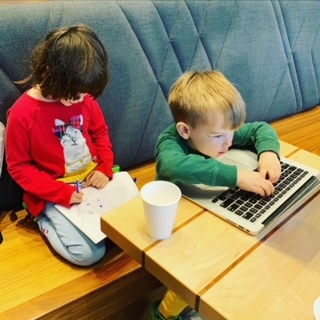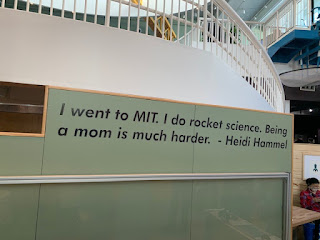BASS Review 2021: Identity in ‘To Buffalo Eastward’ by Gabriel Bump
 |
| What life on the road looks like with kids! |
I almost bailed before I’d begun. First I lost my copy of BASS 2021, with all the notes I’d written around this story; then the travel I’m doing got too much and I was thrown out of every small routine I’d established for myself. I wonder if I would have persevered quite so much if this story wasn’t one about the flux state of travel, and the feature of being on the road that forces you to examine your identity. Having an actual submission deadline coming up gave me the burst of creative procrastination I needed to see this across the line.
I’ve been traveling with my family (husband and two young kids) since August 2020. We do it slowly and then in bursts. Hole up somewhere for a couple of months, get restless, destabilize ourselves for a month in transition. This is all intended and meant to be fun and enriching. Oregon, Washington, Idaho, Utah, Colorado; far too long in Wyoming; a month of short stays to get to the Chicago suburbs, where we parked up for the summer in a short term rental. We left a week ago and are heading back for California, taking six weeks about it and feeling deeply ambivalent.
Unsurprisingly then, ‘To Buffalo Eastward’ really resonated with me. The ball of emotions I am, I felt as though there was some meaning to this being the first story I would read and write about. I’d been looking forward to this project for a long time, and now here it was, and here I was on the page. Everywhere. The surreality, the fragmented confusion, the anxieties and overanalysis and the tendency to over-pathologize one’s behavior and problems (“One of my problems is not understanding my problems”; “That was another thing wrong with me”—very accurate as a portrayal of my inner monologue!). The urge to change, the resolutions and promises you make yourself that you know are empty (the quitting cigarettes for our protagonist; for me, it’s getting back to healthy eating and wine-free days). The social anxiety, the fear of traveling somewhere unknown and the dangers it might present. The frustration of letting the actions and needs of others dictate your own identity and behavior, as you frantically assess it all internally.
The bookstores! They feature heavily in our itinerary too, help shape the character of the places we stay. The choosing of literary identities—maybe it’s weird, but I do this too, align myself with characters and writers, different in every town, and read accordingly. At home in California I was the busied-headed mother Bernadette Meyer from her Letters…; in Oregon I became the protagonists from Shirley Jackson stories; in Washington I was N. K. Jemisin’s Essun, changing, different, often in transition. I loved seeing our protagonist and their new friends do this too. Small wonder I identified with this story.
 |
| Dudley's Bookshop Cafe in Bend, Oregon |
I didn’t know much about Ellison’s Invisible Man, and so before doing some investigating I just took it as quite a literal ‘the protagonist feels invisible, misunderstood, not cared about’, which works well enough within the story, where they are pushed and pulled by the decisions of others and don’t seem to have much agency, in the group at least. Of course, there’s much more to it than that. Note here that I am using “they” as the pronoun because gender isn’t established—part of the ambiguity that is so integral to the story, I think. I did find myself looking for clues as to the gender of our Invisible Man throughout, even as I guessed that was part of the point—I’m trying to pin another person down, as we all do. The premise: person on the road, smoking, smacked of lone male. But the gentle nature, the insecurities and the easy admission to crying, the dreaming of owning kittens and working from home and writing books, the worries about safety and the vulnerability made me think I was reading a female protagonist for a while—interesting what that says too, the ease with which I made those kinds of assumptions. It changed again with the dynamic between the protagonist and the carpenter. Choosing “Man” for their name settled things for me, even as that answers nothing at all.
Presumably we are talking about Ellison’s Invisible Man. Again, I felt some ambiguity here, with the use of the word “the”, suggesting that maybe Bump wants you to wonder if it is H.G. Wells’ protagonist after all—perhaps that is reaching, but there is a reading in which that works, too, just not as well. Ellison’s echoes many of the themes here: existentialism, social invisibility, mental health, identity (pre)determined by others, traveling to different places in an attempt to start again. Using this story as a reference point doesn’t bode well for our protagonist, as problems continue to happen for Ellison’s Invisible Man, no matter where he goes.
It’s interesting to me then that our Invisible Man is reluctant to pick a literary identity. They didn’t have this one ready to go—they had to scramble to find one from their memory. So maybe it doesn’t feel as apt to them as it does seem to the reader—and therefore there is hope for our protagonist yet. There’s that ambiguity again, the need for everyone to pin down and fully identify who other people are, but IM is resisting that. Instead, they want to know what everyone’s real names are, though ultimately they go along with this game because everyone else is doing it.
 |
| Working on this blog post in Kaldi Coffee, St. Louis, MI |
The openness to strangers, the slivers of space by which you might enter each other’s worlds, that can happen while traveling is something I recognized from my own experience. As I am writing this, I am witnessing a surprise reunion between college-age friends and was—am—moved to tears in this coffee shop in the Central West End of St. Louis. I’m now watching the girl after her friends have all left, absolutely beaming, face full of emotion. I am projecting and inserting myself into her world, without even speaking to her. It’s part of the reason why I wondered how much of the interaction with Sancho, Daisy, and Jordan in the story is actually real. It’s probably overdone now to have it all just “be in their head” but it did cross my mind several times, and here’s why.
What are the chances that our bookish protagonist meets three other lovers of books during this road trip, and goes on a bender with them? They aren’t bookish and socially awkward, like our protagonist (although I’ve a feeling that IM presents to others as perfectly sociable—they get invited to a party by a stranger, after all) but extroverted enough to pick up acquaintances comfortably—working against type here, which of course is always fine. And of course, it’s in Cleveland, where IM and their mother were worried they might run into trouble with locals. Far from it. They’re into the same things as IM, and have confidence enough to take them under their wings. Perhaps this is part of the Kaftan absurdity present in Ellison’s work; perhaps this is wishful fantasy, an attempt by IM to craft a narrative and finally tell a story.
Then there’s Sancho Panza, who is supposed to represent reality, a foil to Quixote’s idealism. That seems concrete enough: maybe these side characters real, after all. Sancho says that he works for “an idiot, a monster, a liar.” We later find out he is talking about himself—unless, of course, he is lying about having a business empire. Either way he has outed himself as a liar, and therefore his role as the anchor to reality has crumbled. The fact that he made IM run out of the building in shame, rather than behaving like a business owner about it, is also strange and calls his claims into further doubt. He was a carpenter with keys to places, who didn’t pay his bar tab, but that’s all we really know.
The two women, who aren’t even in focus to IM at first, are also interesting. I thought it an accurate portrayal of social anxiety and alienation that IM was focusing on their facial features and trying to find differences, finding them in the lines after a while (breaking their faces down into composite parts to do so). It was almost like he was crafting two interchangeable women for his story, trying to give them their own identities, and struggling (they still don’t seem very different to me). Another interesting thing: none of the other characters choose a protagonist for their fictional identity. They all choose foils, sidekicks, antagonists.
 |
| At a campsite on Lake Michigan, just north of Chicago, IL (Bump's protagonist started here and went east - we finished up here and then drove back west) |
How to read the drug scene in light of all this? Even more confusing was the revelation of IM and their friends leaving one of their group on an island in the snow, possibly without a boat, after taking drugs together. Was this a terrible secret they had been carrying around, why they found other people difficult? It doesn’t seem to add up that way. The times IM reports seeing the boy they abandoned afterwards seem more like strange apparitions, making me wonder if this boy even survived this abandonment. IM hasn’t learned from this (in a story sense) about taking drugs and the dire outcomes it has. They do recall this at the moment of taking them again, at least. Perhaps, if this is a story that IM is crafting during his lonely, sad drive east, maybe this is an attempt at redemption for that moment. So, this time, they all have this alienating and frightening but ultimately beautiful experience together; afterward, two of the group abandon IM but leave an encouraging message, and the final member of the group saves IM, handles it as they have one final last thrill of assured escape. Perhaps this is the hopeful difference between Ellison’s Invisible Man and ours—Ellison’s never had someone covering him.
There are plenty of things I’m missing out here. I spent a lot of time thinking about why Bump didn’t include a comma in the title. I kept putting one in, and then thinking about what “to buffalo” meant in a non-geographical sense (it means to overawe, intimidate, or baffle—all of that seems quite appropriate here). I wasn’t that interested in Pidge, so haven’t discussed her much. I haven’t touched upon the racial aspect, mostly because I don’t know how much it directly impacts the story—although the digging into the mother’s history suggests that it does more than I realize (to me, those parts were about how heritage and identity can sometimes be alienating and confusing—you think you should feel a connection to your ancestors, but it’s limited and fleeting, at best). I’m looking forward to the novel. I hope we learn their name.
As you can see, I did not bail. I bought a new copy of BASS 2021, then my husband found my marked-up copy in the trailer. Like Bump of his protagonist, I am feeling hopeful that these analyses to come will lead to new adventures.
November 5th, 2021
Here's Karen Carlson's far more professional take over at A Just Recompense. She is unsurprisingly way ahead of me here (I dilly-dallied with posting because I needed to come up with a blog name...)


Hi Rhiannon - I was just looking at my "Intro" post for BASS 2021 and I saw your comment, and came looking to see if you got started posting about these stories to help with your own story writing. Glad I found you!
ReplyDeleteIt's a sign that you started with a "road story" given your own travelling. that sounds like a fascinating way of life. I'm not sure I could do it, I'm nowhere near as adventurous so I'll have to experience it vicariously through you.
Great job on this story writeup! How about another one?
Thank you so much for these lovely words of encouragement! I've just posted my review of Miracle Girl and about to start on Our Children, but goodness me is it hard to stick to any kind of posting schedule! You're such a prolific blogger--any tips for me? It'll be fits and starts over here, I expect. And I am finding that I read less because I don't want to charge too far through BASS when I am stories behind on the write-ups, so I've been reading essays in between, but hungry to get through the stories!
DeleteYour post on Miracle Girl is amazing, I love the "origin story" angle. Seems to me you're doing just fine without any advice from me! Do what works for you, whatever that may be. It took me a couple of years - really! - to feel like I had any idea what I was doing. So don't be afraid to experiment, keeping in mind your goal, which was originally to improve your writing skills. And if that goal changes, that's fine, too - I discovered I didn't want to write fiction once I started blogging and realized I just wanted to write, not invent characters and plots.
DeleteWhatever works -